Rachel Held Evans's Blog, page 5
January 14, 2016
Why I’m making just one resolution as a new mom
Like all new parents, my husband and I have a lot of plans for our little guy, due to meet the world in just a few weeks.
We plan to breastfeed.
We plan to limit screen time.
We plan to teach him to be empathetic, confident, and kind.
We plan to raise him Christian, despite of our own persistent doubts about God and struggles with the Church.
But we also know that plans can change and that flexibility and adaptation are far more important skills to master than stubbornness or certainty…especially when it comes to parenting. Even our most valued goals will require on-the-ground adjustments and on-the-fly compromise. As scary as it is to admit, very little of the future is in our control.
So when we dream and plot about the next 20 years—from where we’ll send him to school to what we’ll tell him about Santa—we’ve been careful to avoid making too many hard-and-fast rules.
…Except for one.
The single resolution I’m making as a new parent is to totally strike from my lexicon, both verbally and inwardly, the phrase: “I’m a bad mom.”
It is officially banished—named as the vicious lie that it is and condemned to the hellish pit from which it came. My husband, family, and friends are all on notice: If it is uttered, even in jest, call me out and set me straight. I’m not a bad mom.
I’m a good mom who’s having a bad day.
I’m a good mom who made a mistake.
I’m a good mom who bought way more newborn clothes than she needed because she has a pathological weakness for dinosaur pajamas.
I’m a good mom struggling to balance childcare and work
I’m a good mom who lost her temper.
I’m a good mom who doesn’t know what to do next.
I’m a good mom who just needs a good cry.
I made this resolution because, as an older mom, I’ve had the chance to learn from friends and peers who took the leap before me. In observing their ups and downs, triumphs and fails, I’ve identified this as the great “mommy kryptonite,” the one thing that can fell even the bravest, wisest parents who stand so tall in my esteem.

She awakened the force and I'm making a person. So we're both pretty badass.
The truth is, if you care about being a good parent, you’re probably a good parent. If you love your kid unconditionally, and are committed to seeing him or her thrive amidst all of life’s obstacles, you’re doing it right…or at least right enough, which, let’s face it, is all any of us can hope for.
I’ve been able to observe this reality somewhat impartially over the last decade, so it seemed wise to make this resolution before sleep deprivation, hormones, fear, and the comparison game kick in and make it so much harder to keep. Sometimes you have to stand outside of yourself for a moment and offer yourself the same compassion and grace you would a good friend. My friends are amazing moms who sometimes make mistakes and get overwhelmed. There’s no reason to believe I won’t be the same.
In Christianity, Satan, (or the devil), is known as The Accuser. His aim is to convince the children of God that their sins, failures, and fears constitute their identity. Whether you consider this character real or metaphorical, the response to his accusations must be the same: “Not today, Satan. I am a beloved child of God and there is nothing you can say or do to change that. You’re a liar. Go away.”
While I suspect even this simple resolution will be difficult to keep once reality sets in, I figure saying it out loud will help my chances. Maybe I can model for my son what it looks like to stand tall in one’s ultimate identity as one of God’s beloved.
So pray for me and for Dan if you think about it. We’re excited and scared and a little overwhelmed.
But I have no doubt we’re going to be good parents.



January 8, 2016
Follow Friday: Megan DeFranza
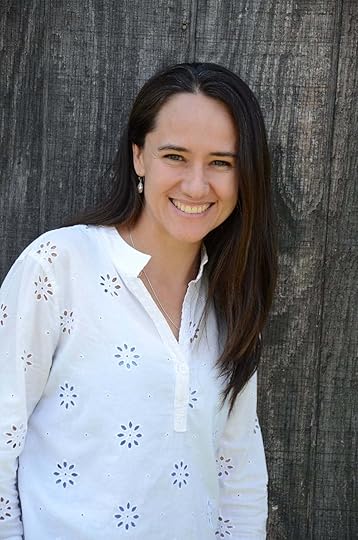
I’ve been meaning to highlight Megan DeFranza's work for months now, as it has proved immensely helpful in some of my “real life” conversations about gender and sexuality, particularly with more conservative friends and family who are somewhat new to the conversation.
Megan is a Christian theologian who facilitates conversation around controversial issues for churches, Christian organizations, communities, and colleges, particularly around issues related to sex, gender, and sexuality. Much of her recent work has focused on sharing the stories and experiences of intersex people and examining what Scripture has to say about people who do not fit into rigid, binary gender categories. You can check out her findings in her book, Sex Difference in Christian Theology: Male, Female, and Intersex in the Image of God.
One of my favorite things to watch and share is this brief interview with Megan about the content of her book. I especially appreciated her comments on how Genesis 1-2 gets distorted in conversations about gender.
I’d also recommend checking out Megan’s blog, Scholastica’s Seedlings, where I’ve found some of the clearest and simplest arguments online in support of LGBTQ identities. See especially “Transgender 101 (for conservative Christians),” “Transgender 104: Reconsidering the scope of the Fall,” and “Why I am a Christian for Marriage Equality.” Perhaps what I appreciate most about Megan is the way she thoughtfully and gracefully engages those with whom she disagrees. She has a special gift for making a killer argument without sacrificing civility. (Oh, and Megan’s guest post for Peter Enns’ series on biblical scholars’ “aha moments” is another must-read.)
A few more recommendations: You can watch Megan team up with Lianne Simon in a lecture for Calvin College’s sexuality series where Lianee shares about her experience growing up intersex. And if you doubt Megan’s commitment to LGBTQ justice, see her statement to students in the wake of Gordon College’s position paper on sexuality.
As you know, when it comes to discussing gender and sexuality, I generally prefer to hear from LGBTQ people themselves, who are more than capable of speaking for themselves and who too often see their humanity diminished to an issue up for debate. (Check out my past posts on gender and sexuality, as well as several other “follow Fridays” for links to LGBTQ writers, ministers, and activists.) But Megan proves an exception to the rule, and has become one of the first people I recommend to my more conservative friends and readers seeking to approach gender and sexuality with a more open mind. So keep her on your radar. I’m sure there’s more good work to come!



December 5, 2015
On “outgrowing” American Christianity

© 2014 Vitor Esteves, Flickr | CC-BY | via Wylio
Every now and then a blog post or article will make the rounds in which the author claims to have “outgrown” church or religion or, in this case, American Christianity.
I remember having similar feelings of emancipation, of “starting over, from scratch” when I first began to realize the evangelical faith I had inherited was not the only kind of faith there was. And perhaps such feelings are a necessary and unavoidable part of growing up, of making that important distinction between oneself and one’s parents.*
And yet, when it came time to write a book about church (which, like every book, began with the rather rigorous and uncomfortable exercise of confronting my own bullshit), I couldn’t deny the reality that, as much as I may dream of it, there’s no starting from scratch…for any of us. Our culture, our past, our biases, our experiences, our communities, our wounds, our healing—this isn’t the baggage we carry; it’s the skin we wear. We can’t just slough it off.
Sure, it would be easier to tell the story of my emancipation from the evil ways of those Christians who identify as conservative, evangelical, American. But it wouldn’t have been a true story. While my disagreements with many in that community are important and real, those Christians were, and continue to be, my friends. They are often the first to show up at my front door with a casserole when the family’s down with the flu. They taught me to love and memorize Scripture, to change a diaper, to rejoice with those who rejoice and weep with those who weep, and to think critically enough to deconstruct and reassess some of their own teachings. Most importantly, they were the first people to introduce me to Jesus, something I never want to take for granted.
Certainly others bear much deeper scars, but even the most painful religious experiences cannot simply be discarded. They must be confronted, molded, repurposed. This is why, in the wake of my last book release, I so strongly disliked headlines about my “leaving evangelicalism for the Episcopal Church.” While I’m happy to acknowledge that I’ve switched denominational affiliation, there is much about evangelicalism that I joyfully bring with me through the doors of St. Luke’s Episcopal Church and which the people there joyfully receive. Very little of my faith has involved leaving and arriving. The vast majority of it has involved wrestling, meandering, stretching. As the saying goes, it’s a work in progress. My spiritual GPS has yet to chirp, “ You have arrived.”
I suspect all these claims of having left empty religion to find the true faith are ubiquitous in both evangelical and progressive Christian publishing culture precisely because they stem from the same illusion—that we are each a blank slate, that we have the ability to start over. But the idea that an American can just stop being an American, or that a Christian can just stop being religious, strikes me as naïve at best, arrogant at worst. It’s no better than the Bible reader who insists he’s not interpreting the text, just reading it, or the white male theologian who insists his theological views are the objective default, while those of women, African Americans, or Christians from the global South and East are contextual.
Let’s be real, folks: If you’re reading the Bible, you’re interpreting it. If you identify as a Christian, you’re part of a religion. If you’re an American citizen living in America, you can deliberately surround yourself with global perspectives (a good idea!) but you can’t just opt out of American Christianity. It’s far better to acknowledge the fact that our contexts, privileges, affiliations, and blind spots affect our worldview than it is to announce we’ve finally overcome or outgrown them. I find it odd that so many who claim to have a postmodern view of Christianity seem so entrenched in modern, Enlightenment-based ideas of objectivity and progress.
Writing Searching for Sunday forced me to consider that perhaps real maturity is exhibited not in thinking myself above other Christians and organized religion, but in humbly recognizing the reality that I can’t escape my own cultural situatedness and life experiences, nor do I want to escape the good gift of my (dysfunctional, beautiful, necessary) faith community. This consideration made the writing process infinitely more difficult and infinitely more rewarding. I suspect it is having the same effect on my faith.
The truth is, I am a Christian, which means I am religious. And I am an American, which means my Christianity is profoundly affected by privilege, by Western philosophy, by 17th century Puritanism, and by Psalty the Singing Songbook. My American Christian heritage includes both Martin Luther King Jr. and the white segregationists who opposed him - a reality that is both empowering and uncomfortable, but one I can’t escape, one I want to look squarely in the eyes.
Loving the Church means both critiquing it and celebrating it. We don’t have to choose between those two things. But we cannot imagine ourselves to be so far above the Church - including the American Church - that we are not a part of it. Like it or not, those of us who continue to follow Jesus will have to do so with our adopted siblings by our side.
Yes, we are called to grow and mature, and yes, our convictions and denominational affiliations will likely change, but I’ve found I’m a better writer—and a better person—when I’m more focused on outgrowing the old me than I am on outgrowing other people in my community.
After all, this is Kingdom growth. There aren’t ladders, only trellises.
###
(*Note: I generally enjoy John Pavlovitz's writing. I obviously relate to many of his experiences and agree with many of the points of his post. My aim here is less to critique and more to add a slightly different perspective. This isn't a call-out, just a conversation.)



November 19, 2015
There Was Room at the Inn

© 2010 Lauren Mitchell, Flickr | CC-BY | via Wylio
I want to begin by saying I don’t want any trouble. I’m just a simple businessman with a family to feed and a record to set straight.
It has come to my attention that ever since Caesar’s pesky census drew thousands to the city of Bethlehem, rumors have been circulating around the region that my inn is overcrowded and inhospitable. This is simply not the case. As our loyal customers know, ours is the largest and friendliest inn in Bethlehem—always buzzing but never without a vacancy—and we offer reasonable rates, a variety of room options, and a delicious continental breakfast of bread and honey every morning. Our inn has a long and proud history of welcoming all sorts of people through its doors…except, of course, those people.
So here’s what actually happened: A couple of those people showed up looking for a room for the night during the big census rush. Yes, I turned them away, but not because we didn’t have enough room or food (we did!) but because I wasn’t about to let a couple of Nazarenes—no matter how needy or pitiful—drain our resources or compromise our security.
See, it’s a well-known fact that people from Nazareth are mostly thieves, rapists, moochers, and terrorists. We have an expression around here to sum it up: “Can anything good come out of Nazareth?” I’m sure some of them are good people and all, but mostly we get their worst.
Sure, the woman appeared to be exhausted and in labor and her husband looked desperate and scared, but that could have just been a show. Just think of all the weapons she could hide beneath her clothes! Imagine how much her husband planned to eat! You can never be too careful with these people.
Frankly, I thought it was pretty generous of me to offer them the barn.
Had I known the birth of the child would become something of a legend, with those hooligan shepherds running all around town spreading tall tales about angels and a Messiah and peace on earth, I would have sent them to the next town so another discerning innkeeper would reject them. Instead, the “no room at the inn” myth has gained considerable traction in recent years, and as a result, I’ve watched wealthy travellers lumber right past our doors without even inquiring after vacancy. (I’ve heard they’ve been stopping instead at the next inn over, which is unfortunate given the bed bug situation…or so I hear.)
Word on the street is that the famous family is now among the hordes of refugees fleeing Herod’s genocide. Apparently, they’ve gone to Egypt because those bleeding-heart Egyptians will take anyone. Good riddance, I say. We certainly don’t want them here.
But I digress. My point is this: Yeah, it seems kind of heartless to send a woman in labor out into a cold night with nowhere to go. But I made a tough call in the name of security. Among our guests that night were several good religious families, some Pharisees and Sadducees, a troupe of Roman soldiers, and a lovely teenage boy named Barabbas. It was my duty to protect them from dangerous people.
So please help me spread the word that there was in fact room at the inn and that we’d love to welcome more guests through our doors, so long as they aren’t Nazarenes, Samaritans or other riffraff.
Oh, and if you would like to leave us a positive review at Trip Advisor, that would be great.
***
On Wednesday, a young Syrian family fleeing violence in their native country was forced to change their resettlement plans when the governor of Indian declared they would not be welcome in his sate because of their ethnicity. The married couple, who has a five-year-old son, had been working with U.S. officials and nonprofit organizations for three years to obtain refugee status and move to America. They were diverted to Connecticut, where they received a personal welcome from that state’s governor.
“Jesus said: 'For I was hungry and you gave me nothing to eat, I was thirsty and you gave me nothing to drink, I was a stranger and you did not invite me in, I needed clothes and you did not clothe me, I was sick and in prison and you did not look after me…Truly I tell you, whatever you did not do for one of the least of these, you did not do for me.’”



November 11, 2015
See you in Nashville!

I’ll be speaking at Lipscomb University’s annual Landiss Lecture Series on Thursday, Nov. 12, at 7:30 p.m., in the Swang Chapel in Lipscomb's Ezell Center. The event is free and open to the public.
See you there!



October 27, 2015
See you in Philly and New Orleans!

© 2010 Flavio~, Flickr | CC-BY | via Wylio
Next up on the speaking schedule…
Thursday, October 29, 7 p.m.
Eastern University, St. Davids, PA
McInnis Auditorium
Gender & Sexuality Discussion: “Gender, Power, & ‘Biblical Womanhood’”
Friday, October 30, 10 a.m.
Eastern University, St. Davids, PA
McInnis Auditorium
Windows on the World Lecture: “Living the Questions”
You can get more info on the Eastern University events here. Both are free and open to the public.
Saturday, November 7, 11 a.m. & 1 p.m.
St. Charles Avenue Baptist Church, New Orleans, LA
Mable Palmer and CBF Louisiana Stagg-Tolbert Lecture Series: “Keep the Church Weird”
Sunday, November 8, 11 a.m.
St. Charles Avenue Baptist Church, New Orleans, LA
Sunday Worship & Sermon
You can register for the Saturday New Orleans event here. (Sunday worship is free and open to the public.)



October 6, 2015
On Giving Testimony: Why “Why Christian?” Worked
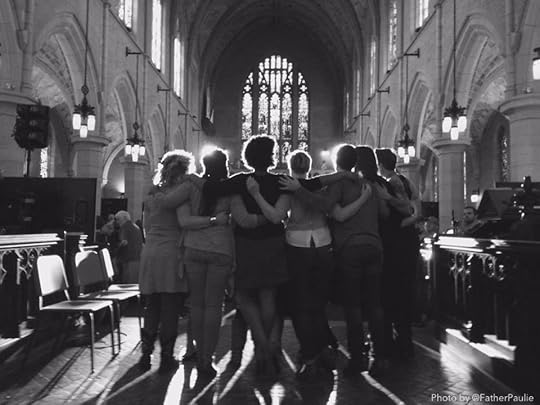
Photo by paul lebens-englund
Tiffany Thomas had reached a crescendo.
“There is deliverance in the music, there is healing in the music, there is love—there is love— in the music!”
As the 29-year-old pastor of South Tyron Community United Methodist Church concluded her testimony about the enduring power of Christian hymns and spirituals to connect people to God, particularly in the black community she serves, the 900+ people crammed into Minneapolis’ St. Mark’s Cathedral that afternoon rose to their feet and cheered.
And in a moment that would repeat itself at least a dozen times over the course of the inaugural “Why Christian?” conference, my friend Nadia Bolz-Weber and I looked at each other from our seats in the choir loft with a mixture of joy and disbelief in our faces, as if to say, “What just happened here?”
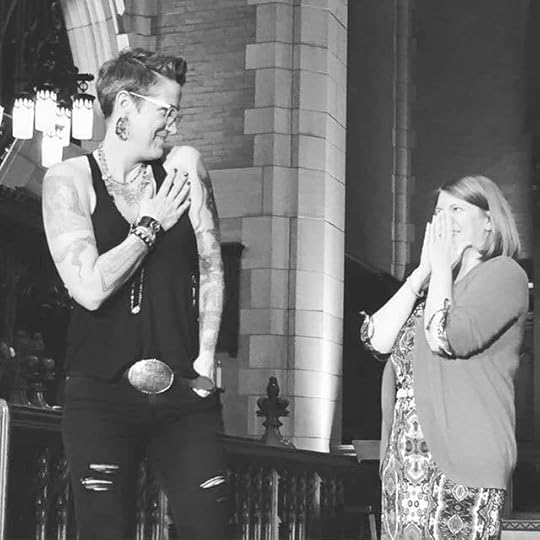
The two of us had been plotting and planning for this event for more than a year, but never in our wildest dreams did we expect...this.
...This level of passion, humor, and preparedness from every single speaker.
...This much love and support from everyone involved.
...This undeniable outpouring of the Spirit.
...This fleshy, tangible, complex, multi-faceted, doubt-riddled, question-drenched, hard-won yet resoundingly-clear answer to the great riddle that brought us all there:
Why Christian?
Why—with all the atrocities past and present committed in God’s name, amidst all the hostile divisions ripping apart Christ’s Church, in spite of all our own doubts and frustrations and fears about faith—are we still Christian? Why do we still have skin in the game?

Photo by Jim Chaffee
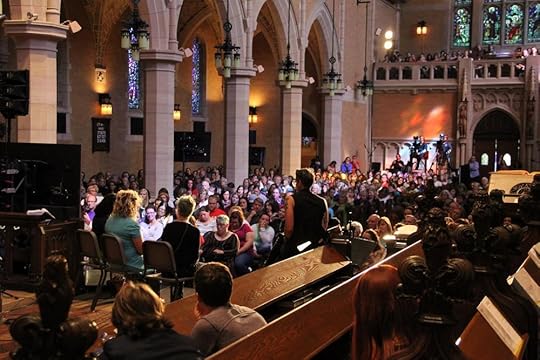
Photo by Jim Chaffee
I came into the event hoping for just enough faith to answer that question for myself, and I left with cup running over, with those familiar convictions of the Christian faith striking me fresh:
I am a Christian because of the incarnation, because in the words of Jes Kast-Keat, “this is an embodied religion.” Or as Kerlin Richter put it: “I am a Christian because having a body wasn’t always good news for me, but then I met Good News that had a body. In Jesus I met a God who spits and kisses, who yells and cries…I am a messy and embodied person and this is a messy and embodied faith.”
“God knows pain,” declared Austin Channing Brown, “not in an abstract way, but real, bloody, torturous pain…and it matters that God didn’t opt out.” Or as Mihee Kim-Kort so succinctly put it: “I have skin the game because God has skin the game.”
I am a Christian because of sin and repentance, because as Nadia likes to say, “self-righteousness feels good for a minute the way peeing your pants feels warm for a minute,” or as Kerlin put it: “...Christianity is not a good religion for self-improvement. Christ calls us to die to ourselves, not remodel ourselves… So if you want to hangout with grownups, you are going to need to learn to forgive, apologize, repent, and repair.”
I am a Christian because of Scripture, because like Kerlin, “I love being caught up in a sweeping story in which I am not the central character,” and because like Winnie Varghese, I have found that “some of the texts that are the most terrifying turn into the ones that are most comforting and truthful,” particularly to those on the margins.
Thank you to @wsvarghese for a stunning message. @wxconference #WX2015 pic.twitter.com/QcX4Xe5dSW
— St. Lydia's (@StLydias) September 18, 2015
I am a Christian because the good new is good news for all, because, as Winnie put it, “Christianity is a theology of the Other, the despised and outcast finding a home,” because in the words of Catholic scholar Nichole Flores “human dignity is always the right answer,” and because, as Rachel Murr so boldly declared from the depths of her own painful experiences, “the gospel is good news for gay people too.”
I am a Christian because Christianity gives me the language to lament and to doubt, “to confess the ugly realities” as Austin said—from the violence I observe in the world and in my heart to “to the sin of white America” which Emily Scott described as the attempt “to still the voice of a whole people and keep them from singing.”
I am a Christian because, like Allyson Robinson, “I don’t always know if this story is true, but I choose to live my life as if it were. I choose to live as if the things Jesus died for were worthy of God’s sacrifice and therefore worthy of mine.” Faith is a risk. It’s a gamble. But as Emily Scott put it, “being a Christian means living at the fulcrum of our fear.” I am a Christian because, at the end of the day, the story of Jesus is the story I’m willing to risk being wrong about.
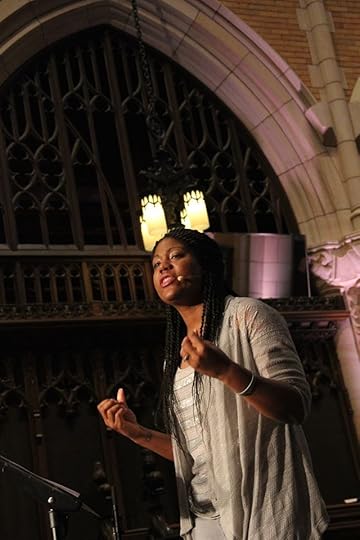
Photo by Jim Chaffee
I am a Christian because of the sacraments, which Kerlin describes as “faith under our fingernails,” and where Jes says “abundant life is not only personal, but communal,” experienced in bread, wine, water, words, touch, sound, and smell. In the sacraments, “Jesus comes to us again, and again, and again, and again,” said Jodi Houge, “abundance from scraps and crumbs, God showing up in barley bread.”
I am a Christian because, try as I might, I can’t follow Jesus on my own, because, as Rachel Murr put it, “I want to take part in bringing in God’s kingdom and I don’t know how to that without the community of believers.” And because that kind of community “just isn’t something you get from your yoga class,” as Nadia points out.
And, like Tiffany, I am a Christian because of the music. Not just the music we sing on Sunday mornings, or the music Rachel Kurtz so thoughtfully led us through during “Why Christian?” but the music of holy defiance these fourteen women sang together that weekend.
We were evangelical and Lutheran, Baptist and Episcopalian, Latina and black and white and Indian and Korean, High Church and Low Church, Catholic and Protestant, Reformed and Methodist, straight and gay and bisexual and transgender, pastors and scholars, writers and activists, single ladies and mothers, introverts and extroverts, crunchy dreadlocked mamas, tattooed and foul-mouthed priests, sweet-talkin’ Southerners, and six-inch-heels-boasting fashionistas. We weren’t exactly your typical Christian women’s conference lineup, (nor was this a “women’s conference” to begin with). We were just Christian people doing what Christian people actually do—pastoring, protesting, mothering, teaching, healing, singing, swearing, sweating, overturning tables, setting tables, tearing down walls, calling out demons, breaking bread, confessing sins, baptizing sinners, preaching the Word, taking authority, surrendering authority, laughing till it hurt, forgiving and being forgiven, hugging, crying, doubting, trusting, unapologetically giving testimony and unabashedly cheering one another on. Together we proved that the wisdom of the world—(that women can’t lead, that women can’t support each other, that women are defined by stereotypes and gender norms)— is utter foolishness in light of God’s good work in us and through us.
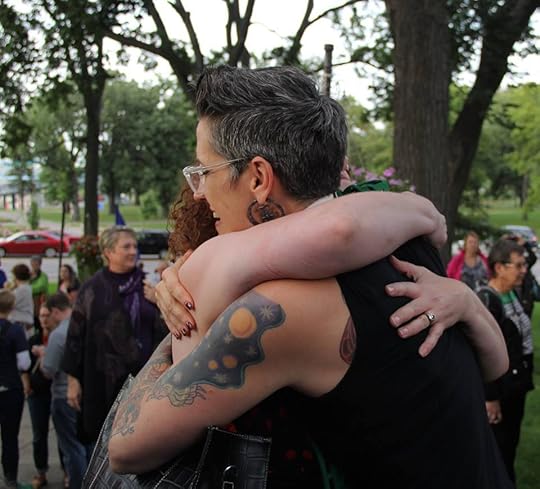
Photo by Jim Chaffee
And with volunteers, a church staff and an audience that caught the vision and sang right along, it just…worked.
It worked because my amazing booking agent, Jim Chaffee, rescued the event at a moment when we thought we’d have to give it up, organized all the logistic, and with the help of his partners Rose, Joy, and Craig, brought life and direction to “Why Christian?” it wouldn’t have otherwise had.
It worked because St. Mark’s Episcopal Cathedral is a beautiful place made up of beautiful (and flexible!) people who gladly served more than 900 people communion from their Table.
It worked because our volunteers were outstanding and took ownership over how best to welcome participants into this sacred space, thinking of all the little details that matter so much to achieving true hospitality.
It worked because, in a way that far surpassed any previous conference experience of mine, our speakers were for one another, literally cheering each other on from the choir loft. No one brought an ego. No one checked out once her part was done. Each woman relaxed into her own personality and speaking style and then listened, rapt, to the next person to speak. There is something profoundly energizing about spending a weekend with women who have been empowered to sing their Jesus song—in their own way and in their own key.
[This spirit of sisterhood can be summed up in one of the highlights of the conference: On Friday afternoon, Emily Scott told a story about how her high school band director, surprised that she had chosen as “unfeminine” an instrument as the trombone, tried to keep her from closing her eyes and swaying to the music by literally pulling her shoulders back and standing on her feet as she played. Emily told the story to illustrate the ways in which we try to silence and stifle one another, an experience with which we women are all too familiar. Well, the next morning, as Rachel Kurtz led the “Why Christian?” congregation in worship, Emily marched out with a trombone in hand and, with eyes closed shoulders relaxed, played “Amazing Grace” as beautifully as I’ve ever heard it. Rachel Kurtz had spent the night before scouring her contact list and driving to a nearby town just to surprise Emily with a trombone and the chance to play her song her way....That was the morning we ran out of tissue.]
Amazing grace. @Broken_Bread #wx2015 pic.twitter.com/pBIh0gus4Q
— Emmy Kegler (@emmykegler) September 19, 2015
“Why Christian?” worked for a lot of reasons, but perhaps most significantly, it worked because of the enduring power of testimony. There simply remains no greater apologetic than a life caught up in the story of Jesus. This, I believe, is what the apostle Paul meant when he instructed Christians to be ready to give a defense for the hope—(not the certainty, not the doctrine, not the logic….but the hope)—that lives within us. I wasn't interested in hearing from people for whom this hope has come easily, but from those for whom it had been hard-won, those for whom it remains a work in progress—ever elusive and yet ever present.
What I loved about “Why Christian?” was that while there were variations in the verses, the refrain was unapologetically orthodox, undeniably Christian. We spoke of sin, repentance, baptism, confession, incarnation, resurrection, and Scripture. We proclaimed the great mystery of the faith—that Christ has died, Christ has risen, and Christ will come again. We served and received communion. We worshipped and prayed together. We gave testimony.
While many (not all) evangelical conferences leave me longing for the freedom to deconstruct and many (not all) progressive Christian conferences leave me longing for something solid upon which to rebuild, “Why Christian?” reminded me both of why I work for reform and why I stay in the game. It reminded me of why I am a Christian to begin with. And it came at a very good time.
I’m so grateful for everyone who helped make it happen, and I look forward to seeing more of you in Chicago next year.
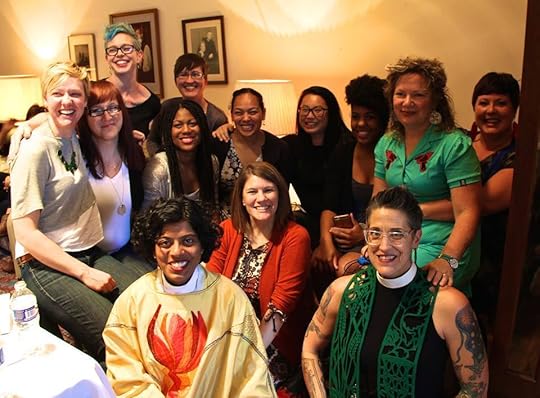
Photo by Jim Chaffee
***
Because folks are bound to ask: Yes, we hope to make some of the talks from “Why Christian?” available online. Details on that are forthcoming. General registration for “Why Christian? 2016” will be available in December, after we’ve given first priority to those who attended this year and those who were on the waiting list. It will be in Chicago, September 30-October 1, at beautiful Fourth Presbyterian Church.



September 5, 2015
See you in California!

© 2011 Alex, Flickr | CC-BY | via Wylio
There’s nothing more rewarding than meeting readers face-to-face, which is why even this introverted homebody looks forward to travel season. I’ve recently updated my fall speaking schedule, which I’ve kept intentionally light with the baby on the way. Next week brings me to Irvine and Glendale, California.
On Friday, September 11 and Saturday, September 12, I’ll be at Irvine United Congregational Church for their annual Faith & Works Conference, where I’ll be joining several other speakers in discussing the intersection of faith and everyday life and the future of the Church in a changing context. You can register for that event here.
On the evening of Saturday, September 12 (7 p.m.), I’ll be at Central Avenue Church in Glendale. This event looks to be a very good time as there will be beer and food and plenty of extra hangout time. Plus, it’s free! Learn more about that event here or RSVP on the Facebook page.



August 26, 2015
“Searching for Sunday” Fall Reading Guide (and Chocolate Chip Cookie Recipe!)
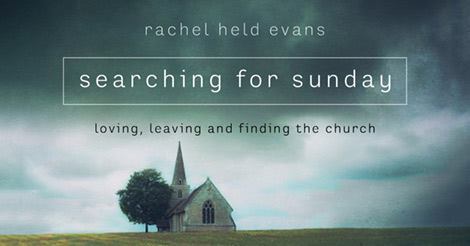
As the kids head back to school and Labor Day approaches, readers are returning to their book clubs and discussion groups. I’ve heard from all sorts of communities who really appreciated the conversation generated by Searching For Sunday - from Sunday school classes, to college student groups, to pastoral and ministry teams, to ladies’ book clubs. It seems that arranging the book around the sacraments (baptism, confession, communion, holy orders, confirmation, anointing of the sick, and marriage) has helped readers - as it helped me - understand and communicate their faith stories in real, relatable, and concrete ways. It’s also generated some amazing ideas among church leaders who have implemented some of the ideas from Searching for Sunday into their services and ministries.
So as the season prompts us to get back together around shared books and shared food, I wanted to let you know about some resources that will make your experience more immersive and interactive. And since I’ve been asked about a dozen times about Caroline Clunk’s amazing dark chocolate chip cookie recipe (referenced in Chapter 19), I’ve shared it here, with Caroline’s permission, for your group’s enjoyment.
Happy reading!
FREE “Searching for Sunday” Discussion Guide:
Discussion Guide - Plain (PDF)
Discussion Guide - Full Color, Print (PDF)
Discussion Guide - Full Color, Tablet (PDF)
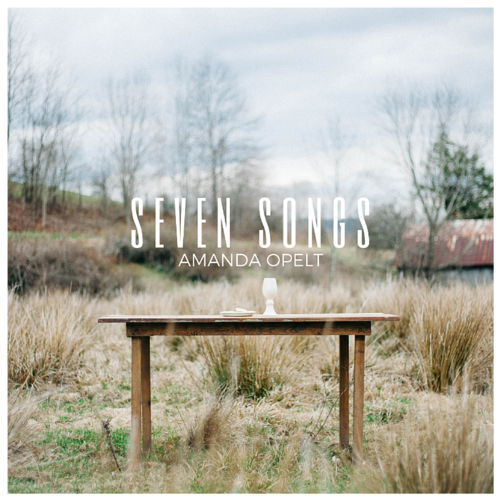
Arranged around the imagery of seven sacraments, Searching for Sunday is a book about all that is frustrating and beautiful and complicated about church, and I dedicated it to my blog readers and my sister, Amanda Opelt. Amanda is a singer/songwriter out of Boone, North Carolina. Her songs are haunting, beautiful, and lyrically profound. Amanda and I have always been close in mind and spirit, but there were moments in listening to the first cuts of Seven Songs that I felt she had reached into my brain and put my best dreams into song. (The “Marriage” song will totally wreck you.) Written and recorded in the mountains of western North Carolina, the album is the effort of a community of musicians and artists seeking to creatively express the longing inherent in each of the sacraments: the hunger for new life, healing, and harvest. It’s the perfect companion to Searching for Sunday.
Videos:We prepared a series of short video reflections around the themes of Searching for Sunday, including “Table,” “Sacraments,” “Scars,” and “Resurrection.” You might also be interested my lecture at Canterbury United Methodist Church entitled “Keep the Church Weird.”
Additional Resources:
Featured Faith Communities -
The Refuge, Denver
Epic Fail Pastors Conference
St. Lydia’s, Brooklyn
St. Gregory of Nyssa Episcopal Church, San Francisco
St. Bernard Abbey, Cullman, Alabama
St. Luke’s Episcopal Church, Cleveland Tennessee
Thistle Farms, Nashville
St. Augustine’s Chapel at Vanderbilt, Nashville
Gay Christian Network
Carr United Methodist Church
House for All Sinners and Saints, Denver
Most-Cited Books -
For the Life of the World by Alexander Schmemann
Life Together by Dietrich Bonhoeffer
An Altar in the World by Barbara Brown Taylor
The Story of Christianity, Volumes I & II by Justo Gonzalez
Take This Bread by Sara Miles
Remember Who You Are by Will Wilimon
The Sacred Meal by Nora Gallagher
Evangelicals on the Canterbury Trail by Robert Weber
Check out my Searching for Sunday Pinterest board for ideas and inspiration and Ruth Meharg's bird series inspired by the seven sacraments.
Check out #SearchingForSunday on Instagram for pictures from fellow readers, including several reading groups.

A photo posted by Taylor Cunningham (@taylorcunning9) on Jul 9, 2015 at 8:36pm PDT
Caroline’s Dark Chocolate Chip Cookies:
2 cups all-purpose flour
1/2 teaspoon baking soda
1/2 teaspoon salt
3/4 cup unsalted butter, softened or melted
1 cup packed brown sugar
1/2 cup white sugar
1 tablespoon vanilla extract
1 egg
1 egg yolk
2 cups dark chocolate chips
Directions
1. Preheat oven to 325. Grease cookie sheet or line with parchment paper.
2. Sift together flour, baking soda and salt; set aside.
3. In a medium bowl, cream together the softened butter, brown sugar, and white sugar until well blended. Then beat in the vanilla, egg, and egg yolk until light and creamy.
4. Mix in the sifted ingredients a little at a time until blended. Stir in the chocolate chips using a wooden spoon. (For best results, chill the dough a few hours before baking.)
5. Drop cookie dough a tablespoon at a time onto the cookie sheet with cookies about 3 inches apart. Sprinkle a dash of sea salt on each drop if desired.
6. Bake for 12-15 minutes.
Notes from Caroline:
“I have a few tricks for these that I think make all the difference. First of all, I chill the dough before baking. I chilled mine overnight, as I made this batch of dough really late at night, but even just two hours would be sufficient. After I scoop them out onto the tray, I press a little flaked sea salt on top of each cookie. I use a Maldon flaked sea salt, which is not always easy to find, so you can easily leave this off; I just love the salty/sweet contrast. I bake mine for about 12 minutes and right as the edges are starting to brown and the middles aren't quite done, I take them out and let them cool entirely on the cookie sheet. The residual heat from the cookie sheet helps finish baking the cookie but still leaves it soft and gooey in the middle.”



August 13, 2015
10 Questions for Target Critics Regarding “Boys’ Toys” and “Girls’ Toys”
As you may have heard, Target recently decided to do away with signage in their children’s toys and bedding departments designating certain merchandise for boys and certain merchandise for girls.
Legos and dolls and singing teapots, it seems, are reportedly enjoyed by children of all genders.
This may seem like an unremarkable turn of events, but according to Grant Castleberry of the Council on Biblical Manhood and Womanhood (flagship organization for the complementarianism movement, which advocates hierarchal gender roles in the home, church, and society), it represents a severe “cultural capitulation” which, “instead of helping guide children towards embracing who they actually are, blurs reality,” “confuses them,” and “drags them through the dark labyrinths” of their parents’ gender-based delusions.
Dark labyrinths indeed.
So in light of the fact that Dan and I are now parents-to-be and will be making big decisions regarding bedding and toys that will apparently fix the course of our child’s future, I have ten questions for Mr. Castleberry and the CBMW:
1. Can you tell me exactly where I am to check to determine the gender of a given toy?
2. Do you recommend disciplining a little girl who plays with Legos and blocks (as they may tempt her to become an engineer) or a little boy who plays with dolls (as they may tempt him to become... a father)?
3. You say, “The Bible teaches that men are wired by God to protect and to pursue...” Where? Where does the Bible say this?
4. You say, “The Bible teaches that...women, on the other hand, are wired by God to nurture and be pursued…” Where? Where does the Bible say this?
5. Is it possible that Sarah, Rachel, Ruth, Deborah, Jael, Esther, Martha, Mary Magdalene, Mary of Nazareth, Lydia, Priscilla, and other biblical women who exhibited initiative, leadership, and valor were corrupted by the gender neutral toy aisles of ancient Near Eastern markets? Might their parents have painted their nurseries an unbiblical shade of blue?
6. I am a good leader and also a woman. And I enjoy football. Do you know of a place where I can get my faulty “wiring” checked? (Note: My father and I loved to play with blocks and toy cars/trucks together when I was little. Might this be his fault?) Similarly, my husband is incredibly nurturing, especially with animals and children. Do you know a place where he can get his faulty “wiring” checked?
7. Are you aware that at the turn of the century, it was often recommended that boys wear pink and girls wear blue? How did that society depart from clear biblical gender norms?!
8. Will you also be advocating for additional signs for the entertainment section of Target indicating which movies, music and books are appropriate for adult women vs. adult men? Will you push for the kitchenware section to be painted pink and the power tools section to be painted blue? How can grown adults be expected to make purchasing decisions without clear, unambiguous signs telling them what they want based on their gender?
9. How can Christian families avoid “cultural capitulation” by ensuring that our boys are aggressive, violent, and unemotional and our girls are quiet, unobtrusive, and bad at math?
10. Is there any way you could also deem all further merchandising of “Frozen” unbiblical? Please?
I’m sure you have questions for the CBMW too. Feel free to leave them in the comment section.
See also:
The Absurd Legalism of Gender Roles
The Absurd Legalism of Gender Roles, Exhibit B: Guys and Dolls
The Absurd Legalism of Gender Roles, Exhibit C: “As Long as I Can’t See Her”



Rachel Held Evans's Blog
- Rachel Held Evans's profile
- 1710 followers



